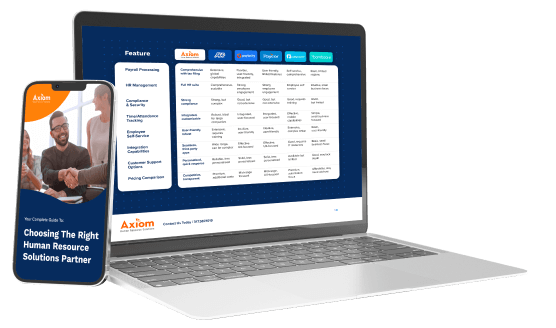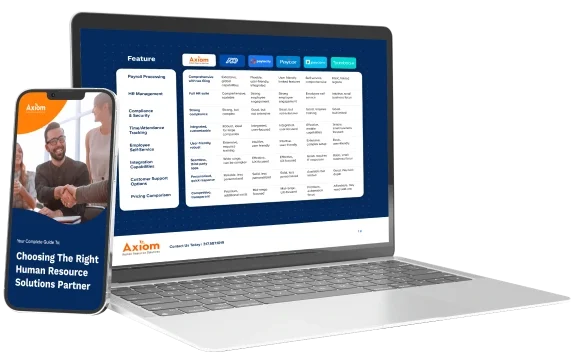
For Indiana-based employers, managing payroll in-house has become increasingly complex. With compliance risks, software limitations, and increased pressure on internal teams, many HR leaders are asking a foundational question: What does it really cost to outsource payroll?
This isn’t just a budgeting exercise—it’s a strategic consideration. The cost of payroll outsourcing depends not only on your employee count and pay frequency but also on the breadth of services you receive, the compliance risks you avoid, and the kind of partnership you get in return.
In this guide, we’ll break down the real-world costs of payroll outsourcing in Indiana. We’ll use current benchmarks, walk through the hidden fees that inflate your invoice, and show you how to evaluate the value you actually get from your provider.
What Payroll Outsourcing Costs in Indiana (With Real Numbers)
Payroll outsourcing in Indiana typically follows two pricing models: a flat monthly base fee plus a per-employee rate, or a percentage-of-payroll model more common with PEOs.
According to 2025 data from ProMatcher, Indiana businesses can expect to pay between $117 and $133 per month for a basic 10-employee payroll package, averaging $125.26/month. That translates to roughly $12.50 per employee.
For businesses with larger headcounts or more complex needs—such as multiple pay frequencies, bonuses, commissions, garnishments, or multi-state tax filings—pricing may rise to $18–$25 per employee per month, especially when tax filing and year-end reporting are included.
If you’re evaluating providers that charge based on a percentage of payroll, expect to pay between 2% and 5% of gross payroll. For example, a business running $150,000 in monthly payroll could be charged $3,000–$7,500 annually just to process payroll—regardless of complexity.
But these are only benchmarks. Pricing can vary significantly depending on the provider, contract terms, and which services are bundled versus add-ons.
What Affects Payroll Pricing—And What Doesn’t
1. Number of Employees
This is the most obvious driver. Most PEPM (Per Employee Per Month) models are tiered. As headcount increases, the per-employee rate tends to decrease—but total costs still climb.
2. Pay Frequency
Weekly payroll costs more than bi-weekly or monthly because it requires more processing. If your company runs two different pay cycles (e.g., hourly + salary), many vendors will charge an additional fee.
3. Payroll Complexity
Does your team earn commissions, overtime, bonuses, or shift differentials? Do you track multiple job codes or departments? The more complex your payroll, the more support—and technology—it requires to process correctly.
4. Add-On Services
Services like time tracking, benefits deductions, PTO management, and garnishment handling are often treated as optional add-ons—even though they’re essential. These are frequently the difference between compliance and liability.
5. Support Level
With many vendors, the lower the price, the less support. You may get email-only service or wait days for resolution. Axiom builds proactive support and compliance guidance into every client relationship. That’s not an add-on—it’s core to how we work.
What doesn’t drive cost—but should?
Compliance updates. Wage law changes. Filing education. These are too often left off the radar—until something breaks.
Hidden Costs Most Vendors Don’t Disclose
Plenty of Indiana employers sign contracts with payroll providers only to realize later that the monthly base fee was just the beginning.
Here are the most common hidden charges you should look out for:
Setup & Implementation Fees
Some vendors charge $150–$500 just to configure your account, import employee data, and “go live.” Ask up front if setup is included.
Year-End W-2 and 1099 Processing
Don’t assume year-end forms are part of the package. Many providers charge $5–$8 per form for W-2s and 1099s.
Off-Cycle Payroll Runs
Running a one-time bonus or correcting a missed payroll isn’t always free. Some vendors charge for off-cycle runs—even if the error was their fault.
Check Printing or Delivery
Even if your team primarily uses direct deposit, paper checks can cost $1.50–$5 per check. If you still have unbanked employees, this matters.
Tax Filing Across States
Multi-state employers often pay additional filing fees per jurisdiction, per pay cycle. If your Indiana-based team includes remote workers, be sure to ask.
Support Tiers
“24/7 support” often translates to bots and delayed ticketing. Phone access and real-time resolution are frequently premium add-ons—unless you work with a firm like Axiom that builds real support into your plan.
Transparency is a core part of Axiom’s pricing model. We believe Indiana employers should know exactly what they’re paying for—no buried fees, no surprises.
Cost of In-House vs. Outsourced Payroll
Some HR leaders believe keeping payroll in-house is more cost-effective. But when you dig into the full cost model, it’s not always true.
In-House Payroll Costs Include:
- Software licensing and annual renewals (often $2,000–$6,000/year)
- Salaries or prorated admin time from HR/Finance team
- Internal compliance research and training
- Higher risk of human error, penalties, and inconsistent reporting
According to the IRS, approximately 40% of small to mid-sized businessesface payroll penalties annually due to late filings, incorrect withholdings, or improper classification.
Outsourced Payroll Includes:
- Predictable monthly or per-employee pricing
- Automatic tax updates and compliance alignment
- W-2 and 1099 generation
- Garnishment processing
- Access to experts (not just software)
What You Actually Get for the Price
Cost is just one part of the decision. You also need to understand the value.
With Axiom, you’re not buying a software license. You’re partnering with a dedicated team that understands Indiana law, understands how HR and payroll intersect, and takes responsibility for execution.
Axiom Payroll Services Include:
- Weekly, bi-weekly, or monthly payroll processing
- Timekeeping integration with UKG Ready and other platforms
- Garnishment and deduction management
- Federal and Indiana state/local tax filing (including WH-1, WH-3, 941, 944)
- W-2 and 1099 year-end processing
- FLSA classification guidance
- Overtime compliance and reporting support
- Custom payroll reporting
- Consistent point of contact—not a call center
Other vendors offer flat pricing. We offer flat pricing and real partnership. That’s the difference.
What to Ask Before Signing a Contract
Before you sign with any provider, ask these five questions:
- What’s included—and what’s not—in your base fee?
- Do you support Indiana WH-1, WH-3, and county-specific filings?
- How do you handle off-cycle runs, garnishments, or corrections?
- Will I have one point of contact or a rotating service queue?
- Can your team support our HR team in compliance conversations?
If a provider can’t answer clearly, walk away.
Payroll outsourcing isn’t just about cutting costs—it’s about reducing risk, improving accuracy, and freeing up your team to focus on what matters.
When you know what payroll should cost—and what value you should expect—you’re far more equipped to make the right call for your team, your business, and your bottom line.
If you’re ready to explore what transparent, Indiana-based payroll support looks like, we’re here to help.
Frequently Asked Questions About Payroll Services Cost in Indiana
1. What is the average payroll services cost per employee in Indiana?
The average cost of payroll services in Indiana ranges from $12 to $25 per employee per month, depending on your provider and the complexity of your payroll. Businesses with fewer than 50 employees typically pay a base fee plus a per-employee rate. Companies with more complex payroll needs—like multiple pay types, bonus cycles, or multi-state filing—can expect to pay on the higher end of that range.
2. What’s typically included in the base cost of payroll outsourcing in Indiana?
Most payroll outsourcing providers in Indiana include basic wage processing, pay stub generation, and limited direct deposit in their base pricing. However, many exclude critical services like WH-1 and WH-3 filings, garnishment handling, time tracking integration, or year-end W-2/1099 processing. Always request a breakdown to understand what’s bundled—and what’s billed separately.
3. Is it cheaper to outsource payroll or keep it in-house?
For most Indiana businesses, outsourced payroll is more cost-effective than managing it internally—especially when you factor in labor hours, payroll software licensing, and the risk of noncompliance. Outsourcing reduces admin time, improves accuracy, and helps avoid costly IRS and DOL penalties, which impact thousands of small businesses annually.
4. Can I outsource payroll without joining a PEO or co-employment agreement?
Yes. Many Indiana-based providers, including Axiom, offer standalone payroll outsourcing without requiring a co-employment relationship. Unlike PEOs that bundle HR and assume shared legal responsibilities, HRO models allow you to retain full employer control while getting expert support for payroll, compliance, and tax filings.
5. Do Indiana payroll providers handle local and state-specific tax filings?
Not all providers handle state-specific filings like the Indiana WH-1, WH-3, or county-level local taxes. If your provider is national or generic, these may be overlooked or misfiled. It’s critical to choose a payroll service that understands Indiana payroll compliance requirements and proactively manages these submissions.



